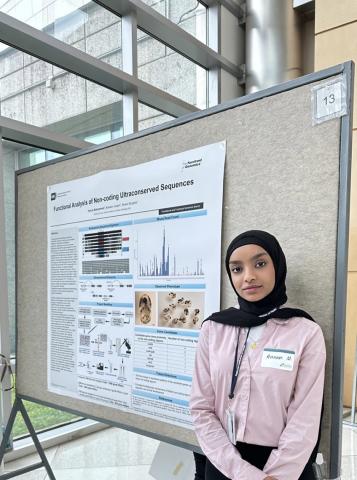Geneticist in-Training
Cultural Roots Inspire Intern’s Interest in Genetics

This summer, college student Hanna Muhammed was challenged to combine her interests in public health and genetics by joining NIH’s Immersive Summer Program for Research in Genomics (iSPRinG). A first-generation rising college junior at the University of Maryland, Muhammed spent the summer working under seasoned researchers at the National Human Genome Research Institute (NHGRI).
Muhammed’s interest in genetics originated upon learning about her Egyptian heritage. She was fascinated by the country’s diversity.
“We all speak the same language and are from the same country, but we look so different,” said Muhammed.
After digging deeper to learn why that was, she discovered the study of genetics and subsequently NIH.
For her internship, Muhammed worked in NHGRI Senior Investigator Dr. Shawn Burgess’s lab studying regeneration in fish. The group targets how zebrafish regenerate hearing. Specifically, Muhammed worked with a postdoc who is targeting ultraconserved DNA sequences, which can provide valuable insights into the genetic basis of various biological processes. Studying these helps scientists understand the mechanisms involved and potentially develop new treatments in the future. From setting up and cleaning tanks to collecting eggs and keeping track of growth, Muhammed was enthusiastic about her work and learning more at NIH.
Muhammed was also looking forward to working down the hall from Dr. Francis Collins, whose work on Hutchinson-Gilford progeria syndrome (HGPS) inspired her to delve into other areas of genetics research. Although she was unable to work in his lab this summer, fate—in the form of a delayed elevator—allowed the two to meet.
“I’m waiting for the elevator, and then this man in my peripheral was standing there,” Muhammed recalled. “We’re in the elevator and I look at him like, ‘that’s Dr. Collins, isn’t it?’”
Of course, it was, and she was excited to speak with him, even for just a brief moment.

Photo: myranda tarr
Muhammed isn’t the only one in her family working at NIH. Her father, Esam Muhammed, works for the NIH Office of Research Services driving patient shuttles, and was the catalyst for Hanna applying to the internship. The elder Muhammed inquired with NIH staff about internship opportunities for his daughter and then strongly encouraged her to apply. He was also a resource for her, providing pointers on key NIH staff she should connect with. Though she sometimes grudgingly started her day much earlier to accommodate her father’s schedule, Muhammed ultimately found working at NIH close to him to be a blessing.
“We can go home together and talk about our day,” she said.
Like many first-time interns, Muhammed did not know what to expect when coming to NIH. She had a feeling the internship would be harder than the classes she took in her first two years of college, especially since those classes were not directly related to the work she would be doing with NHGRI. But expectations are always scarier than reality, and she found the internship both manageable and enjoyable.
“I knew it was going to be difficult, but I didn’t think it would be impossible if I worked hard,” she said.
One key lesson Muhammed learned this summer was time management. In addition to her internship, she also took two summer courses. “I don’t think I’ve taken a break this entire summer,” Muhammed lamented, “but that’s okay.”
She strongly recommends the internship program to other college students who are passionate about health care or science research, and she hopes to return to NIH next year and continue her research on genetics. Muhammed is also practicing for the MCAT and has her sights set on attending medical school upon earning her undergraduate degree in 2025.
